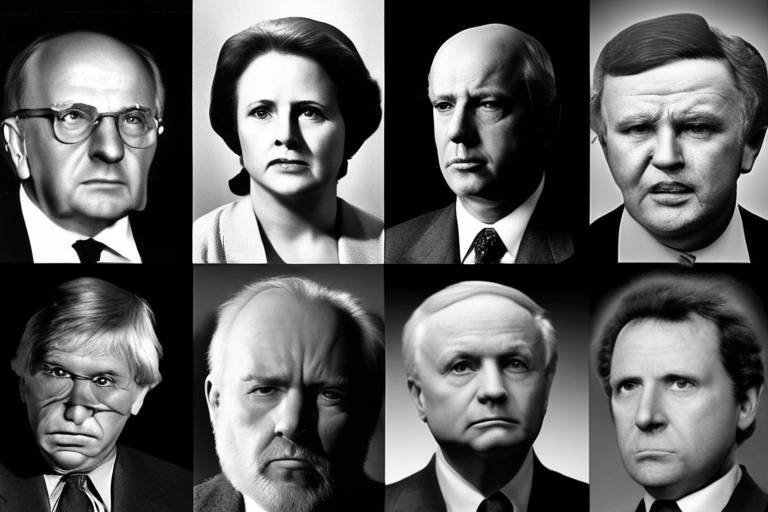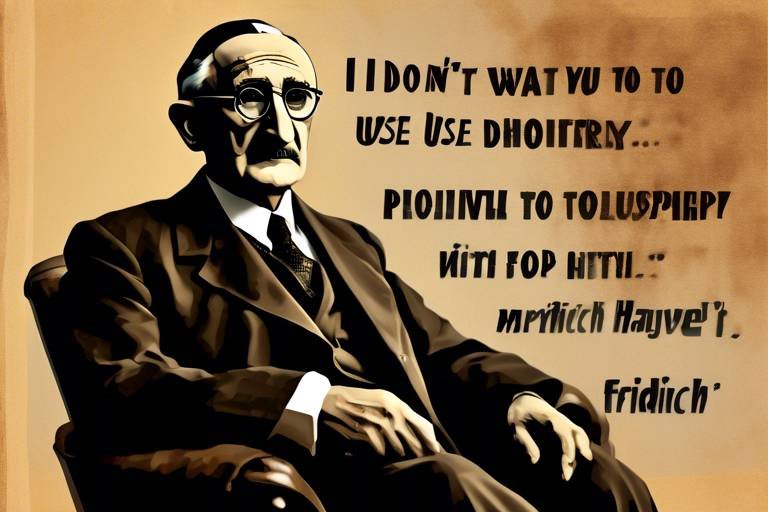The Role of Philosophy in Shaping the American Constitution
The American Constitution stands as a profound testament to the interplay between philosophy and governance. When the Founding Fathers convened to draft this pivotal document, they were not merely creating a set of laws; they were laying the groundwork for a new nation built on the principles of democracy and individual rights. But where did these revolutionary ideas come from? The answer lies in the rich tapestry of philosophical thought that preceded the Constitution's creation. Thinkers like John Locke, Montesquieu, and others provided the intellectual fuel that ignited the flames of freedom and justice, shaping the very essence of American governance.
At its core, the Constitution reflects the Enlightenment ideals that championed reason, liberty, and equality. These concepts were not just abstract theories; they were practical frameworks that influenced how the framers envisioned a government that would serve the people rather than dominate them. The philosophical underpinnings of the Constitution can be seen in its structure, its emphasis on checks and balances, and its commitment to protecting individual rights. As we delve deeper into this topic, we will explore how these philosophical ideas coalesced to form a document that has stood the test of time, influencing countless democracies around the world.
Key philosophers such as John Locke and Montesquieu provided foundational ideas about government and individual rights that significantly influenced the framers of the Constitution, shaping its core principles. Locke's theories on natural rights and the concept of the social contract were revolutionary. He posited that individuals possess inherent rights to life, liberty, and property, which must be protected by the government. This idea resonated deeply with the framers, who sought to create a government that would safeguard these rights against infringement.
Meanwhile, Montesquieu’s advocacy for the separation of powers laid the groundwork for the checks and balances system integral to the Constitution. His argument that power should not be concentrated in one entity echoed the fears of tyranny that plagued the colonies under British rule. The framers, inspired by these philosophical insights, crafted a document that not only defined the structure of government but also enshrined the rights of individuals, ensuring that the government would be accountable to the people it served.
The concept of the social contract is a cornerstone of modern political philosophy and played a crucial role in the Constitution's development. This theory posits that governments derive their authority from the consent of the governed, emphasizing the importance of democracy and accountability. The framers understood that for a government to be legitimate, it must operate with the explicit approval of its citizens. This idea was revolutionary at the time and laid the foundation for a government that is both representative and responsive to the needs of its people.
Locke’s contributions to political thought cannot be overstated. His theories on natural rights and government by consent were instrumental in shaping the Constitution's emphasis on life, liberty, and property. The framers envisioned a just society where individuals could pursue their interests without fear of oppression. Locke's influence is particularly evident in the Declaration of Independence, which echoes his sentiments about the right to life, liberty, and the pursuit of happiness. The framers sought to create a government that would protect these rights, ensuring that individual freedoms were not merely theoretical but woven into the fabric of American law.
The idea of natural rights, as articulated by Locke, underscored the necessity of protecting individual freedoms within the Constitution. This principle ensured that government powers are limited and that rights are safeguarded. The framers recognized that a government could only be just if it respected the natural rights of its citizens. This understanding led to the inclusion of the Bill of Rights, which explicitly enumerates the freedoms that the government cannot infringe upon. By prioritizing these rights, the Constitution reflects a commitment to individual autonomy and justice.
Montesquieu's advocacy for the separation of powers inspired the Constitution's checks and balances system. This framework prevents any one branch of government from becoming too powerful, protecting citizens' rights from potential government overreach. The framers were acutely aware of the dangers of tyranny, and Montesquieu's ideas provided a roadmap for creating a balanced government that would safeguard liberty. By establishing distinct branches of government—executive, legislative, and judicial—the Constitution ensures that power is distributed and that each branch can hold the others accountable.
The Enlightenment era's emphasis on reason, liberty, and equality profoundly influenced the Constitution. This period fostered a political environment that prioritized individual rights and democratic governance. The framers were inspired by Enlightenment thinkers who championed the idea that all men are created equal and deserve the right to participate in their government. This shift in thinking was revolutionary, challenging the traditional notions of monarchy and aristocracy that had dominated European politics for centuries.
The Constitution's federal structure reflects philosophical debates on the balance of power between national and state governments. This arrangement ensures local autonomy while maintaining a unified national framework. The framers grappled with the question of how to distribute power effectively, recognizing that both state and federal authorities play critical roles in governance. This tension between state and federal authority highlights the philosophical discussions on governance, reflecting concerns about tyranny and the need for a balanced distribution of power.
The ongoing tension between state and federal authority is a testament to the philosophical debates that shaped the Constitution. The framers were keenly aware of the potential for tyranny at both the national and state levels, leading them to craft a system that would prevent any single entity from wielding unchecked power. This delicate balance is crucial for protecting individual rights and ensuring that government remains accountable to the people.
The Constitution's Bill of Rights embodies philosophical principles regarding individual liberties. This section of the Constitution ensures that specific freedoms are protected against government infringement, reinforcing the importance of personal autonomy. By explicitly outlining these rights, the framers sought to create a framework that would empower citizens and limit government overreach. The Bill of Rights serves as a powerful reminder of the philosophical ideals that underpin American democracy, ensuring that the government remains a servant of the people.
- What is the social contract theory? The social contract theory posits that governments derive their authority from the consent of the governed, emphasizing democracy and accountability.
- How did John Locke influence the Constitution? Locke's theories on natural rights and government by consent were instrumental in shaping the Constitution's emphasis on protecting individual freedoms.
- What are checks and balances? Checks and balances is a system that prevents any one branch of government from becoming too powerful, ensuring accountability and protecting citizens' rights.
- Why is federalism important? Federalism balances power between national and state governments, ensuring local autonomy while maintaining a unified national framework.

Influential Philosophers
The American Constitution is not just a set of rules; it is a tapestry woven from the threads of philosophical thought. Key thinkers like John Locke and Montesquieu have played pivotal roles in shaping the ideas that underpin this foundational document. Their contributions were not mere academic exercises; they were revolutionary concepts that ignited a new way of thinking about government and individual rights. Imagine a world where power is not concentrated in the hands of a few but is instead a shared responsibility among the many. This was the vision that these philosophers championed, and their ideas continue to resonate today.
Locke, often referred to as the father of liberalism, introduced the notion that individuals possess inherent rights simply by being human. His belief in the natural rights of life, liberty, and property challenged the divine right of kings and laid the groundwork for the idea that governments should exist to protect these rights. This was a radical shift in thinking—no longer were people subjects to be ruled; they were citizens with rights that the government must respect. Locke’s thoughts on government by consent emphasized that true authority comes from the people, a principle that is echoed in the very preamble of the Constitution.
On the other hand, Montesquieu introduced the idea of separation of powers, which became a cornerstone of the American political system. He argued that political power should not be concentrated in one entity but should be divided among different branches of government. This concept was revolutionary and became the basis for the checks and balances system embedded in the Constitution. By ensuring that no single branch could dominate the others, Montesquieu’s ideas protect citizens from tyranny and safeguard their rights.
These philosophers didn't just influence the framers of the Constitution; they ignited a philosophical revolution that changed the course of history. Their ideas encouraged a sense of individualism and democratic governance, providing a framework for a society that values freedom and equality. The debates they inspired continue to shape our understanding of rights and governance today. To put it simply, without the philosophical insights of Locke and Montesquieu, the Constitution as we know it might never have come into existence.
In conclusion, the influence of these philosophers extends beyond their writings; it is embedded in the very fabric of American democracy. Their ideas remind us that the fight for individual rights and a balanced government is ongoing and that the principles they laid down are as relevant now as they were over two centuries ago. As we reflect on the Constitution, we must recognize the profound impact of these thinkers and continue to engage with their ideas in our quest for a just society.

Social Contract Theory
The concept of is a cornerstone in understanding the philosophical underpinnings of the American Constitution. At its core, this theory posits that governments derive their legitimate authority from the consent of the governed. This means that individuals agree, either explicitly or implicitly, to form a society and accept certain rules and norms in exchange for protection and the benefits of communal living. Imagine it as a kind of deal: you give up a bit of your freedom in exchange for safety and order provided by the government. This foundational idea emphasizes the importance of democracy and accountability, which are essential in a government that serves its people.
Key thinkers like Thomas Hobbes, John Locke, and Jean-Jacques Rousseau contributed significantly to this theory, each offering unique perspectives on the nature of the social contract. Hobbes, for instance, believed that in a state of nature, life would be "solitary, poor, nasty, brutish, and short," leading individuals to surrender their rights to a strong central authority for security. In contrast, Locke argued that individuals possess natural rights—specifically life, liberty, and property—that must be protected by the government. Rousseau expanded on these ideas, suggesting that true freedom comes from participating in the general will of the community.
This interplay of ideas shaped the framers' vision of a government that is both powerful enough to maintain order and limited enough to protect individual rights. The framers of the Constitution recognized that government should not be an all-powerful entity but rather a servant of the people. They understood that for a government to be legitimate, it must operate with the consent of those it governs. This principle is evident in the preamble of the Constitution, which begins with the phrase, "We the People," underscoring the idea that authority is derived from the citizens.
Furthermore, the social contract theory has profound implications for accountability. If a government fails to uphold its end of the bargain—protecting the rights and freedoms of its citizens—then the people have the right to alter or abolish that government. This revolutionary idea was radical at the time and laid the groundwork for democratic governance in America. It encouraged citizens to be vigilant and engaged, promoting a culture of active participation in the political process.
In summary, social contract theory not only influenced the philosophical framework of the American Constitution but also established a vital relationship between the government and its citizens. By emphasizing the importance of consent and accountability, it ensured that the government remains a reflection of the people's will, ultimately fostering a society that values both individual rights and collective responsibility.
- What is social contract theory? Social contract theory is the idea that governments derive their authority from the consent of the governed, emphasizing the importance of democracy and accountability.
- Who were the key philosophers behind social contract theory? Key philosophers include Thomas Hobbes, John Locke, and Jean-Jacques Rousseau, each contributing unique perspectives on the nature of governance and individual rights.
- How does social contract theory influence the Constitution? It shapes the Constitution by emphasizing that government must protect individual rights and operate with the consent of the people, ensuring accountability and democratic governance.

John Locke's Contributions
John Locke, often hailed as the father of liberalism, made profound contributions that shaped the philosophical landscape of the American Constitution. His ideas about government and individual rights were not just theoretical musings; they were practical principles that influenced the framers' vision of a just society. Locke's assertion that all individuals possess natural rights—specifically, the rights to life, liberty, and property—became a cornerstone of the Constitution. These rights are not granted by any government; rather, they are inherent to every human being. This revolutionary idea emphasized the importance of protecting individual freedoms, which ultimately led to the establishment of a government that is accountable to the people.
Locke's social contract theory posited that governments are formed by the consent of the governed. In other words, the authority of the state is derived from the agreement of its citizens. This concept was revolutionary at the time and laid the groundwork for democratic principles that are enshrined in the Constitution. The framers understood that a government without the consent of the governed is not legitimate. Thus, they incorporated mechanisms to ensure that the government remains accountable to the people, echoing Locke's belief in the necessity of popular sovereignty.
Moreover, Locke's influence extended beyond just individual rights to the structure of government itself. He argued that a government must be organized in such a way as to prevent the abuse of power. This idea resonated deeply with Montesquieu's advocacy for the separation of powers, which became a fundamental principle in the Constitution. By establishing distinct branches of government—executive, legislative, and judicial—the framers aimed to create a system of checks and balances. This system ensures that no single branch can dominate the others, thereby protecting the rights of individuals against tyranny.
Locke's emphasis on reason and rationality also played a crucial role in shaping the political environment of the time. The Enlightenment era, during which Locke wrote, was characterized by a burgeoning belief in the power of human reason to improve society. This intellectual backdrop fostered an atmosphere where the rights of individuals were not only recognized but actively protected. The framers of the Constitution were inspired by Locke's ideas, believing that a rational and informed citizenry could govern itself effectively.
In summary, John Locke's contributions to the philosophical foundations of the American Constitution cannot be overstated. His ideas about natural rights, the social contract, and the necessity of government accountability shaped the very fabric of American democracy. By embedding these principles into the Constitution, the framers ensured that the rights of individuals would be safeguarded against potential governmental overreach, creating a framework for a just and equitable society.

Natural Rights
The concept of is a cornerstone of John Locke's philosophy, which profoundly influenced the framers of the American Constitution. Locke proposed that every individual is born with certain inherent rights that are not granted by any government; rather, they are intrinsic to human existence. These rights include life, liberty, and property. The framers recognized that protecting these rights was essential to creating a just society, where individuals could thrive without the fear of oppression or tyranny.
Locke's notion of natural rights can be likened to a sacred trust between the government and its citizens. The government exists to protect these rights, and in return, the citizens consent to abide by its laws. This mutual agreement forms the basis of a democratic society where individual freedoms are prioritized. In fact, the Declaration of Independence echoes this sentiment by stating that all men are created equal and endowed with certain unalienable rights.
Furthermore, the framers understood that the protection of natural rights necessitated a framework that limited government power. This is where the brilliance of the Constitution comes into play. It establishes a system of checks and balances designed to prevent any branch of government from infringing upon the rights of individuals. By ensuring that power is distributed among the legislative, executive, and judicial branches, the Constitution safeguards against the potential for abuse. In this way, natural rights are not merely theoretical concepts; they are actively protected by the very structure of the government.
To illustrate the significance of natural rights, consider the following table that outlines how these principles are reflected in the Constitution:
| Natural Right | Constitutional Protection |
|---|---|
| Life | Fifth Amendment - No person shall be deprived of life without due process of law. |
| Liberty | Fourteenth Amendment - No state shall deprive any person of liberty without due process of law. |
| Property | Fifth Amendment - No person shall be deprived of property without due process of law. |
In summary, the concept of natural rights is not just a philosophical abstraction; it is a vital principle that underpins the very fabric of American democracy. By embedding these rights into the Constitution, the framers ensured that individual freedoms would be protected against the whims of government, creating a society where people could pursue their happiness and aspirations freely. The legacy of natural rights continues to resonate today, reminding us that the fight for individual liberties is an ongoing journey.
- What are natural rights?
Natural rights are inherent rights that every individual possesses, such as life, liberty, and property, which are not granted by any government. - How did John Locke influence the Constitution?
Locke's theories on natural rights and government by consent were instrumental in shaping the Constitution's emphasis on protecting individual freedoms. - Why are natural rights important in a democracy?
Natural rights serve as the foundation for individual freedoms, ensuring that governments protect rather than infringe upon these rights.

Checks and Balances
The concept of is one of the cornerstones of the American political system, designed to ensure that no single branch of government can dominate or abuse its power. This idea, championed by the French philosopher Montesquieu, was pivotal in shaping the structure of the U.S. Constitution. Montesquieu argued that the best way to prevent tyranny was to separate governmental powers into distinct branches: the executive, legislative, and judicial. Each branch would have its own responsibilities and powers, but also the ability to limit the powers of the other branches. This creates a system of mutual oversight, where each branch must work in concert with the others, thereby enhancing accountability and protecting individual rights.
For instance, the legislative branch, which is responsible for making laws, has the power to override a presidential veto, thereby checking the executive branch's authority. Conversely, the President has the ability to appoint judges, influencing the judicial branch, while the judiciary can rule laws passed by Congress as unconstitutional, effectively checking the legislative power. This intricate dance of power ensures that no single entity can wield unchecked authority, fostering a government that is both responsive and responsible.
To illustrate how checks and balances function in practice, consider the following table that outlines the powers and responsibilities of each branch:
| Branch | Primary Responsibilities | Checks on Other Branches |
|---|---|---|
| Executive | Enforces laws | Veto legislation, appoints judges |
| Legislative | Creates laws | Override vetoes, confirm judges |
| Judicial | Interprets laws | Declare laws unconstitutional |
This system of checks and balances not only protects against the concentration of power but also encourages collaboration among branches. For example, when Congress proposes legislation, it often requires negotiation with the President to ensure it aligns with executive priorities. Similarly, judicial rulings can prompt legislative changes or executive actions, creating a dynamic interplay that reflects the evolving needs and values of society.
Ultimately, the checks and balances framework is a testament to the framers' understanding of human nature and the potential for power to corrupt. By embedding this philosophy into the Constitution, they sought to create a government that would be both effective and accountable to the people, ensuring that individual rights remain at the forefront of governance.
- What are checks and balances? Checks and balances are a system that ensures no single branch of government can overpower the others, promoting accountability and protecting individual rights.
- Who proposed the idea of checks and balances? The idea was primarily proposed by the philosopher Montesquieu, emphasizing the separation of powers within government.
- How do checks and balances work in practice? Each branch of government has specific powers that can limit the actions of the others, fostering cooperation and preventing tyranny.
- Why are checks and balances important? They are crucial for maintaining a fair and just government, ensuring that power is distributed and that individual liberties are protected.

Enlightenment Principles
The Enlightenment era was a transformative period that laid the intellectual groundwork for modern democracy, and its principles significantly influenced the drafting of the American Constitution. Think of it as the spark that ignited the flames of liberty, reason, and equality. Philosophers of this time championed the idea that human beings are capable of reason and should have the freedom to govern themselves. This was a radical shift from the prevailing notions of absolute monarchy and divine right. It raised questions that resonated deeply with the framers of the Constitution: What is the role of government? How should power be distributed? And most importantly, how can individual rights be safeguarded?
Central to Enlightenment thought was the belief in natural rights—the idea that individuals possess inherent rights simply by virtue of being human. These rights, which include life, liberty, and the pursuit of happiness, became foundational to the Constitution. The framers recognized that a government must be established to protect these rights, not to infringe upon them. This perspective led to the creation of a document that not only outlined the structure of government but also prioritized the protection of individual liberties. The Constitution was, in essence, a contract between the government and the governed, ensuring that the former could only exercise power with the consent of the latter.
Moreover, the Enlightenment emphasized the importance of reason as a guiding principle for governance. Philosophers like Voltaire and Rousseau argued that rational thought should replace tradition and superstition in political matters. This idea was revolutionary; it suggested that laws and governance should be based on reasoned debate and evidence rather than arbitrary rule. As a result, the framers of the Constitution sought to create a system that encouraged deliberation and debate, allowing for a more informed and engaged citizenry. They established mechanisms like the Bill of Rights to ensure that individual opinions and freedoms were not only respected but also actively protected.
In addition, the Enlightenment's focus on equality played a crucial role in shaping the Constitution. The idea that all men are created equal was not just a catchy phrase; it was a profound philosophical assertion that challenged the status quo. This principle was particularly evident in the debates surrounding the Constitution's ratification, where the question of representation and the rights of various groups became a hot topic. The framers grappled with how to ensure that every citizen had a voice in the new government, leading to compromises that would shape the future of American democracy.
To sum it up, the Enlightenment principles of natural rights, reason, and equality were not just abstract ideas; they were the lifeblood of the American Constitution. They provided the framework for a government that was designed to be responsive to the needs and rights of its citizens. The Constitution stands as a testament to the power of Enlightenment thought, embodying its ideals in a document that continues to influence democratic governance around the world.
- What were the main ideas of the Enlightenment that influenced the Constitution?
The Enlightenment emphasized natural rights, reason, and equality, which were foundational in shaping the principles of the Constitution. - How did Enlightenment philosophers contribute to the concept of democracy?
Philosophers like Locke and Montesquieu introduced ideas about government by consent and separation of powers, which are key components of democratic governance. - Why is the Bill of Rights significant?
The Bill of Rights ensures that individual liberties are protected against government infringement, reflecting Enlightenment ideals about personal autonomy.

Federalism and Its Philosophical Roots
At the heart of the American Constitution lies the concept of federalism, a system that delicately balances power between national and state governments. This idea didn't just spring up out of nowhere; it was deeply rooted in philosophical debates that questioned how best to govern a diverse and sprawling nation. Think of federalism as a two-sided coin: on one side, you have the need for a strong central authority to maintain order and unity, while on the other, you have the necessity for local autonomy that respects the unique needs and rights of individual states. This balancing act is what makes federalism both fascinating and complex.
Philosophers like James Madison and Alexander Hamilton were pivotal in shaping the federalist framework, arguing that a strong national government was essential to prevent the chaos of factionalism and tyranny. They believed that a central authority could manage conflicts and promote the common good, but they also recognized the importance of state governance as a means of protecting individual liberties. This duality in thinking mirrors the tension that exists between different levels of government, which is a hallmark of American political life.
To illustrate this philosophical foundation, let’s break down some key ideas that underpin federalism:
| Philosopher | Key Idea |
|---|---|
| James Madison | Advocated for a strong central government to mitigate factionalism. |
| Alexander Hamilton | Argued that a robust national framework was necessary for economic stability. |
| Thomas Jefferson | Emphasized the importance of state rights and local governance. |
This philosophical tug-of-war raises important questions about governance: How do we ensure that federal authority does not encroach on the rights of states? How do we maintain a cohesive national identity while allowing for local diversity? These questions are not just theoretical; they are the very essence of American governance today.
Furthermore, the philosophical roots of federalism also touch upon the idea of representation. The framers understood that a government should reflect the will of the people, which is why they designed a system where both state and federal governments could interact and influence one another. This relationship is akin to a dance—each partner must understand their role and responsibilities to create a harmonious performance. When one partner steps out of line, it can lead to discord, highlighting the need for checks and balances.
In essence, federalism is more than just a structural arrangement; it embodies a philosophical commitment to liberty, equality, and justice. It allows for a pluralistic society where different voices can be heard while still maintaining a unified national framework. The ongoing debates about the balance of power between state and federal authorities are a testament to the dynamic nature of this philosophical foundation, ensuring that the Constitution remains a living document capable of adapting to the needs of its citizens.
- What is federalism? Federalism is a system of governance that divides power between a central authority and smaller political units, like states.
- Why is federalism important? It allows for a balance of power, ensuring that no single entity has too much control while accommodating local governance.
- How does federalism affect individual rights? Federalism helps protect individual rights by allowing states to address local issues while the federal government manages broader concerns.

State vs. Federal Authority
The debate between state and federal authority is one of the most intriguing aspects of American governance. Imagine a tug-of-war, where each side pulls for control over various powers. On one end, we have the states, representing local needs and preferences, while on the other, the federal government aims to maintain national unity and enforce broader laws that apply to all. This dynamic has roots in philosophical discussions about governance, particularly concerning the potential dangers of tyranny and the necessity for a balanced distribution of power.
At the heart of this debate lies the 10th Amendment to the Constitution, which states that powers not delegated to the federal government are reserved for the states. This amendment embodies the idea that states should retain significant authority to govern themselves, reflecting the founders' concerns about a strong central government. They were wary of the potential for federal overreach, fearing that it could lead to a system reminiscent of the monarchy they had fought to escape. Thus, the framers sought to establish a system where both levels of government could coexist, each with its own distinct powers and responsibilities.
However, this coexistence is often fraught with tension. For instance, consider the ongoing debates around issues like healthcare, education, and environmental regulations. States may want to implement policies that reflect their unique demographics and values, while the federal government may impose regulations aimed at ensuring consistency across the nation. This tug-of-war can lead to significant legal battles, as seen in cases like Marbury v. Madison and McCulloch v. Maryland, where the Supreme Court had to step in to clarify the boundaries between state and federal powers.
To illustrate, here’s a quick comparison of the powers typically associated with each level of government:
| Authority | Federal Government | State Government |
|---|---|---|
| Taxation | Imposes federal income tax | Imposes state income and sales tax |
| Education | Sets nationwide education standards | Determines local curriculum and school funding |
| Law Enforcement | FBI, DEA, and other federal agencies | State and local police departments |
| Transportation | Regulates interstate highways | Manages state roads and public transit |
This table highlights how both authorities play crucial roles in governance, yet their differing priorities can lead to conflict. The philosophical implications of this tension are profound, as they reflect deeper questions about democracy, representation, and the rights of individuals versus the collective needs of society. In a way, this ongoing negotiation between state and federal authority serves as a living testament to the dynamic nature of the Constitution itself, which was designed to adapt and respond to the evolving needs of the nation.
Ultimately, the relationship between state and federal authority is a dance of sorts, requiring constant communication and compromise. As citizens, we must remain informed and engaged, advocating for the balance of power that best represents our values and needs. After all, in a democracy, it is our voice that shapes the conversation about governance.
- What is the main difference between state and federal authority? State authority refers to the powers held by individual states, while federal authority pertains to the powers of the national government.
- How does the 10th Amendment affect state power? The 10th Amendment reserves powers not granted to the federal government for the states, allowing them to govern themselves in many areas.
- Can states challenge federal laws? Yes, states can challenge federal laws in court, and historically, this has led to significant Supreme Court cases that define the balance of power.
- What role does the Supreme Court play in state vs. federal authority? The Supreme Court interprets the Constitution and resolves disputes between state and federal powers, ensuring that both levels of government operate within their defined boundaries.

Philosophical Implications for Rights
The Constitution's Bill of Rights is more than just a list of amendments; it represents a profound philosophical commitment to individual liberties. At its core, the Bill of Rights embodies the fundamental belief that certain freedoms are inherent to all people and must be protected from government encroachment. This idea echoes the thoughts of philosophers like John Locke, who argued that individuals possess natural rights that exist independently of government. The framers of the Constitution understood that without explicit protections, these rights could easily be undermined by the very institutions designed to protect them.
One of the most significant philosophical implications of the Bill of Rights is the emphasis on personal autonomy. The framers recognized that for a democracy to thrive, individuals must have the freedom to express themselves, practice their religion, and assemble peacefully. Each of these rights serves as a safeguard against tyranny, ensuring that the government cannot dictate how individuals live their lives. This notion can be likened to a garden; just as a garden flourishes when given space and care, so too does society prosper when its citizens are free to cultivate their own beliefs and values.
Furthermore, the Bill of Rights reflects a commitment to accountability. By enshrining specific rights, the Constitution not only empowers citizens but also holds the government accountable for its actions. For instance, the First Amendment guarantees freedom of speech, allowing individuals to criticize the government without fear of reprisal. This is crucial because it fosters an environment where ideas can be freely exchanged, and where dissent is not only tolerated but encouraged. In this way, the Bill of Rights acts as a check on governmental power, ensuring that it remains a servant of the people rather than their master.
In addition, the philosophical underpinnings of the Bill of Rights highlight the importance of equality. The framers sought to create a society where all individuals, regardless of their background, would have access to the same rights and protections. This principle is evident in the equal protection clause, which mandates that laws apply equally to all citizens. The idea here is that rights should not be privileges granted to a select few, but rather universal entitlements that belong to everyone. This commitment to equality is a cornerstone of democratic governance and reflects the Enlightenment ideals that shaped the Constitution.
To illustrate the philosophical implications of the Bill of Rights, consider the following table that outlines key rights and their philosophical foundations:
| Amendment | Key Right | Philosophical Foundation |
|---|---|---|
| First Amendment | Freedom of Speech | Individual autonomy and expression |
| Second Amendment | Right to Bear Arms | Self-defense and resistance to tyranny |
| Fourth Amendment | Protection Against Unreasonable Searches | Privacy and personal security |
| Eighth Amendment | Protection Against Cruel and Unusual Punishment | Dignity and humane treatment |
In conclusion, the philosophical implications of the Bill of Rights are profound and far-reaching. They not only safeguard individual liberties but also establish a framework for a just society. By embedding these rights into the Constitution, the framers ensured that the principles of autonomy, accountability, and equality would remain at the forefront of American democracy. As we reflect on these foundational ideas, it becomes clear that the Bill of Rights is not merely a historical document; it is a living testament to the enduring struggle for freedom and justice in our society.
- What is the Bill of Rights? The Bill of Rights is the first ten amendments to the U.S. Constitution, guaranteeing individual liberties and rights.
- Why are philosophical ideas important in the Constitution? Philosophical ideas provide the underlying principles that guide the protection of individual rights and the structure of government.
- How does the Bill of Rights protect individual freedoms? It explicitly enumerates rights that cannot be infringed upon by the government, ensuring personal autonomy and accountability.
- Who were the key philosophers that influenced the Bill of Rights? Key philosophers include John Locke, Montesquieu, and other Enlightenment thinkers who emphasized natural rights and the social contract.
Frequently Asked Questions
- What is the significance of philosophy in the American Constitution?
Philosophy played a crucial role in shaping the American Constitution by providing foundational ideas about governance, individual rights, and the social contract. Key thinkers like John Locke and Montesquieu influenced the framers' vision, emphasizing democracy, accountability, and the protection of natural rights.
- Who were the key philosophers that influenced the Constitution?
Prominent philosophers such as John Locke and Montesquieu were instrumental in influencing the Constitution. Locke's ideas on natural rights and government by consent, along with Montesquieu's advocacy for separation of powers, helped shape the core principles of the Constitution.
- What is social contract theory and how does it relate to the Constitution?
Social contract theory posits that governments derive their authority from the consent of the governed. This concept was pivotal in the development of the Constitution, emphasizing the importance of democracy and accountability in governance, ensuring that the government's power is derived from the people.
- How did John Locke's ideas influence the Constitution?
John Locke's theories on natural rights, particularly life, liberty, and property, heavily influenced the framers of the Constitution. His emphasis on the protection of individual freedoms laid the groundwork for the Constitution's focus on limiting government power and safeguarding citizens' rights.
- What are checks and balances, and why are they important?
Checks and balances are a system established by the Constitution to prevent any one branch of government from becoming too powerful. Inspired by Montesquieu's advocacy for separation of powers, this system protects individual rights and ensures that government authority is exercised fairly and responsibly.
- How did Enlightenment principles influence the Constitution?
The Enlightenment era emphasized reason, liberty, and equality, which profoundly influenced the Constitution's development. These principles fostered a political environment that prioritized individual rights and democratic governance, shaping the foundational ideas of the American political system.
- What is federalism, and what are its philosophical roots?
Federalism is the division of power between national and state governments. Its philosophical roots lie in debates about the balance of power, reflecting concerns about tyranny and the need for a balanced distribution of authority to ensure both local autonomy and a unified national framework.
- What are the implications of state vs. federal authority?
The tension between state and federal authority highlights philosophical discussions about governance and the distribution of power. This dynamic is crucial in addressing concerns about tyranny while ensuring that both local and national interests are represented effectively.
- What does the Bill of Rights represent?
The Bill of Rights embodies philosophical principles regarding individual liberties, ensuring that specific freedoms are protected against government infringement. It reinforces the importance of personal autonomy and serves as a safeguard for citizens' rights within the framework of the Constitution.



















